2020, Hungary - Bake at home!
The coronavirus pandemic forced us to revise the plan that we had set up.
Still, many things happened between the beginning of the year and March: the company won the Marketing award of the Hungarian Franchise Association for its “Give yourself, we care about you” campaign, and participated in Sirha exhibition with a grandiose stand in February. We also held our 2nd Leadership Conference this year.
In the first phase of the pandemic, the distribution of our bake-at-home products and the related campaign “Bake at Home!” was met with great success.
A sausage packing robot was also installed in the Kecskemét plant this year, and a cooperation agreement was signed with Danubius Hotels Group. Furthermore, the wholegrain four-cheese pizza slice and the vegan hot dog were added to the product assortment.
Thanks to our expansion policy, new countries joined the network, e.g. the Netherlands and Moldova.
The company is now on a trajectory where strategic attitude, professionalism, and devotion to the products are essential for managing in these times.
Romania: Fornetti’s bake-at-home product family was launched in Romania as well.
Bulgaria: By introducing the bake-at-home products, Fornetti Bulgaria responded quickly and efficiently to the negative market events caused by the pandemic.

2019, Hungary - The beginning of the 4th generation transformation
At the beginning of the year, CO-OP Star Zrt., Fornetti’s special franchise partner, was given the “Multi-brand franchisee of the year” award of the Hungarian Franchise Assocation, and soon after, the company appeared at the Season-opening Touristic Gala again.
From the beginning of the year, Fornetti continued the transformation of stores, implementing new design and modern solutions, and from February, Fornetti’s products were also introduced in Malta.
The Call Center began its operation to facilitate smooth partner service. The first Leadership Conference was held, and numerous technological developments were also implemented. As a part of this, the 3rd line of the Timisoara plant was automated, and a new leavening tower was installed in the plant. In Kecskemét, the silo system was renewed, an automatic washing and cleaning system was installed, the office building was also renovated, and a new fleet of heavy goods vehicles began its operation.
We introduced new products (corn crescent, party crescent, tomato bap, diamond roll with Gouda cheese, apple and salty caramel roll, cheese and bacon roll, apricot bun), and Fornetti won the Superbrands award for the 8th time. In the meantime, we continued developing the 4th generation brand image.
However, the most memorable thing about this year was the record we set: the company had never before been as successful as in 2019.
Romania: The new bags reflecting our current brand image were launched in Romania.
Bulgaria: This year was a period of exceptional performance: Fornetti Bulgaria’s sales increased to 300 tons/month.

2018, Hungary - Popular flavours repacked
The year began with expansion: In January 2018, the Fornetti network began to grow in Cyprus as well.
Fornetti took part in the Season-opening Touristic Gala in February and in the Internorga exhibition in March. The latter is one of Europe’s most prestigious gastronomic expos. This is a professional event where exhibitors from the areas of food industry, bakery and confectionary industry, hotel and hospitality industry, gastronomy industry, and packaging industry can present their innovations, products, and services.
In September, the largest recent development of the company was completed in Fornetti’s Kiskunfélegyháza plant. This included a larger capacity flour intake system as well as an automatic packaging line, and the former carriage system of the leavening and schocking processes was also replaced by leavening and freezing towers. The development started in July, and by September, bakery products were produced with the new technologies.
In November 2018, Fornetti products got a new packaging —the company wanted to keep up with new trends while also looking for uniqueness, and managed to find the colours and feeling that best suited Fornetti.
Romania: Fornetti Romania got another award as it was voted the “Bakery Product Distributor of the Year”. Furthermore, the older elements of the 2nd line were also modernized in a €435,000 investment.
Bulgaria: The 3rd generation transformation of the complete franchise network was completed.

2017, Hungary - A worthy celebration of the company’s 20th birthday
The beginning of this year marked another rise of wages. In March, Fornetti presented its products to the German market in one of Europe’s most important food industry exhibitions, the Internorga.
Following a period of careful preparation, Fornetti launched a talent management programme with the aim of expanding the knowledge base of its employees.

 In July, Fornetti opened a new store at Oktogon in Budapest in the spirit of quality and diversity.
In July, Fornetti opened a new store at Oktogon in Budapest in the spirit of quality and diversity.
Fornetti’s 20th birthday was commemorated at a huge event organized for business partners in September. Soon after, employees joined the celebration: more than 1200 attendants celebrated the company’s 20th birthday at the Fornetti Family Day.
Romania: In a €600,000 investment, the 2nd line of the Timisoara plant was built, resulting in an increased production capacity. In November of the same year, the first FFB store opened in Timisoara.
Bulgaria: Thanks to the diversification of the portfolio and the growing sales, Fornetti Bulgaria became a key supplier of international and local retail partners.

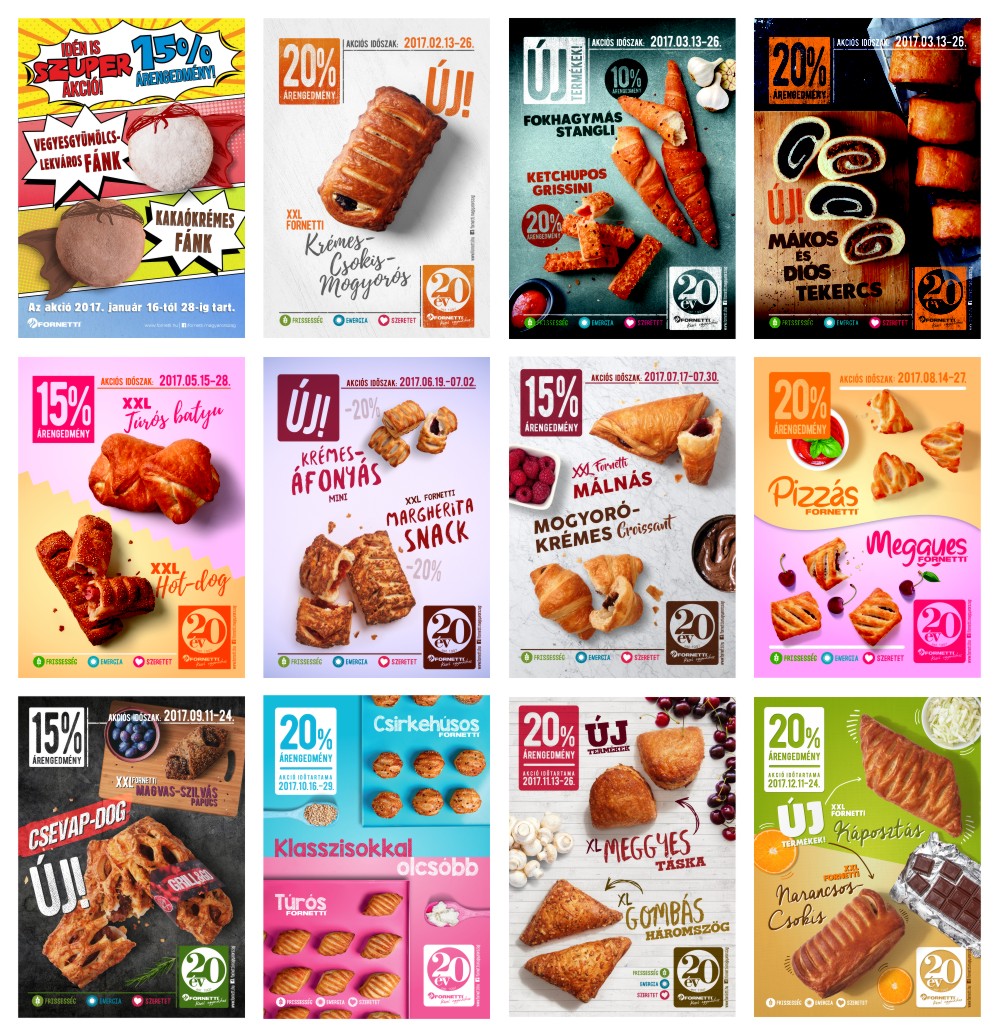
2016, Hungary- The launch of FFB and the awarding of recognitions
In January 2016, the company received a prestigious award: Fornetti once again won the “Franchise network of the year” award of the Hungarian Franchise Association. But the recognitions did not stop here: in autumn, two points of sale were given the SuperStore award.
In April, Fornetti opened its first Fornetti Food and Beverage (FFB) exhibition bakery. In line with changing consumer needs, the bakery offered an easy and fast self-service system, street food products, store brand beverages sweetened with stevia, as well as low-carb and low-calorie bakery products for health-conscious customers.
Wages were raised by ten percent throughout the corporation, and the completion of the first programme of Aryzta AG’s 600 million development resulted in the modernization of production lines and logistics systems.
The increasing responsibility of Aryzta was reflected in the fact that from this year, they appointed leading officials of the Fornetti Group management.
Fornetti’s internship programme called “The professional of the future” started in the same year, offering a chance for food industry technicians to get to know various divisions of the organization.
Romania: Fornetti Romania received an international award: they were voted the “Best Distributor of Bakery Products”. Fleet renewal programmes also started this year.
Bulgaria: The company implemented an investment of nearly €100,000 targeting store developments and the popularization of the 3rd generation brand image.
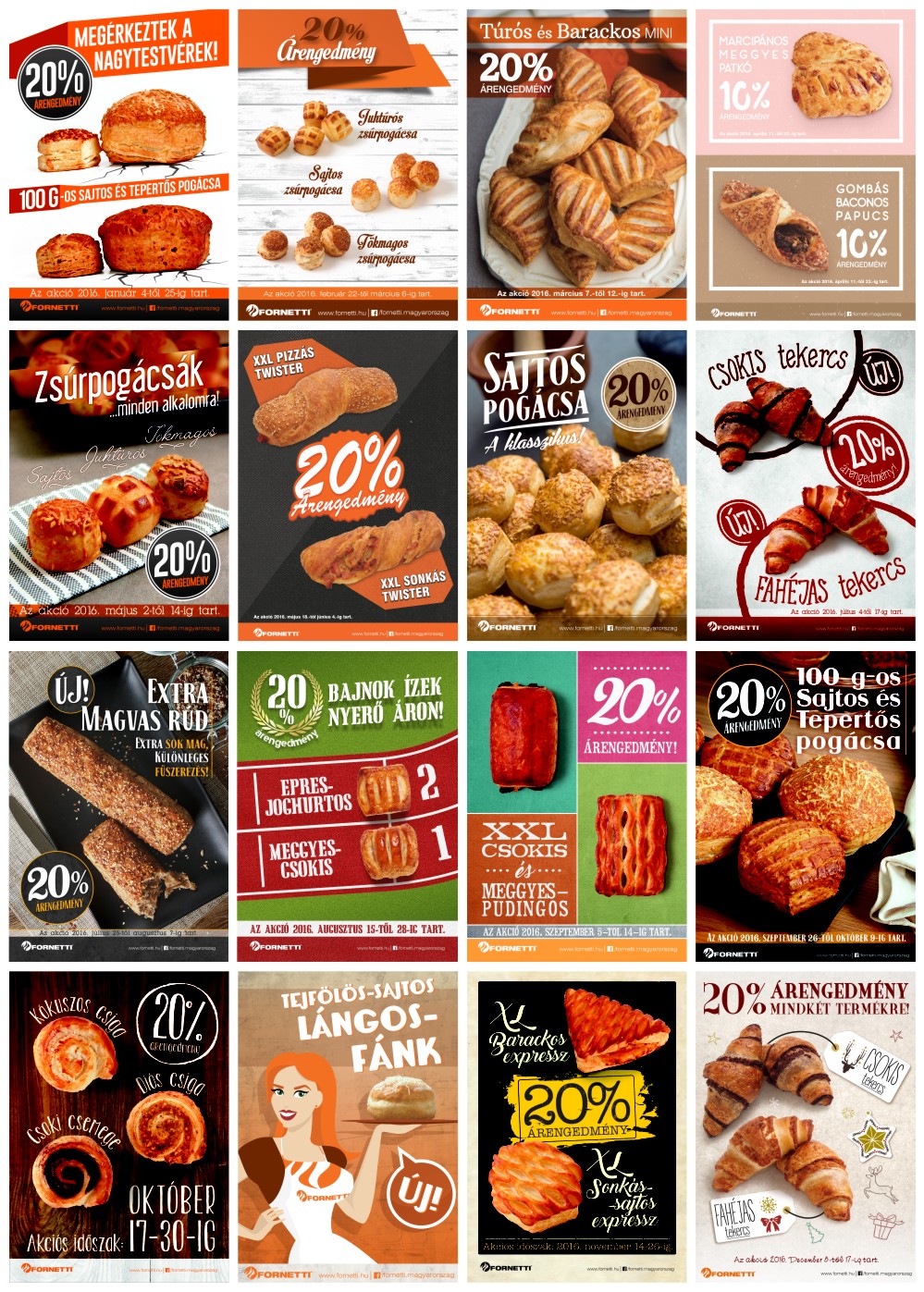
2015, Hungary - The beginning of a new story
Just when Fornetti reached the age of majority, the Aryzta AG, a corporation of Swiss-Irish origins, bought the company on 4th August, 2015, marking the beginning of a new story that was bound to be more spectacular than anything before in the life of the company.
The world’s third biggest manufacturer and distributor of frozen bakery products struck this deal with the aim of further strengthening the power of the brand in the European scene. “In the current structure, Fornetti has reached the limits of its growth. The support of a professional partner with considerable expertise and a stable financial background is inevitable if this fantastic Hungarian company wants to take the next step to take on a significant role in the international competition.” —noted Sebastian Gooding, representative of the Buyer in the deal, adding that “Fornetti is a real Hungarian success story and our goal is to elevate this success story to a European scale in co-operation with the Hungarian management.”
In the months following the change of owners, the company grew considerably, and it reinforced its positions on markets abroad.
The opening of the new furniture plant in Kiskunfélegyháza was another important event of the year. At the time, it had the capacity to manufacture furniture for 4–5 stores each week.
Romania: Following the completion of the legal reorganization, Fornetti Group was bought by Aryzta AG along with the Romanian member company.
Bulgaria: As a member of the Fornetti Group, Fornetti Bulgaria was also acquired by Aryzta AG.

2014, Hungary - We listen to our customers
The brand image survey we started in 2013 and evaluated in spring 2014 showed that Fornetti customers want us to make efforts in terms of the appearance of bakeries to earn their loyalty. From the consumers’ point of view, the ideal bakery has the following characteristics: aesthetically displayed products, freshness, diverse flavours, lighting, cleanliness, tasteful design elements, seasonal promotions, discounts, constant quality, quick serving.
As a leading bakery product distributor and franchisor, Fornetti committed itself to satisfying these requirements. Therefore the management made the decision to go ahead with the design transformation in spite of the significant costs, because this investment was considered to be the key to long-term, guaranteed success in terms of customer loyalty and market development in the context of intense competition.
Romania: As a result of the successful launch of the legal reorganizations, relationships with banks and suppliers were settled.
Bulgaria: The most important result of the year was a strengthened, more intensive co-operation with international retail networks.
2013, Hungary- The birth of four new product ranges
This year was a year of development: besides continuous store renewal projects, successful product launches (olive salt stick, hot dog) and intensive campaign activity also took place.
As an event of special importance, a privately financed investment of over HUF 1 billion was implemented in the Kiskunfélegyháza plant, which was inaugurated by dr Sándor Fazekas, Minister of Rural Development on 7th June. As the minister noted, the investment not only helped the company increase its production, but at the same time, it resulted in the broadening of the product range and the improvement of product quality.
The investment provided the technological background necessary for completing the two-year research and development project, which resulted in four new product ranges: 1) The additive and preservative-free bread with special flavouring leaven; 2) a vegetable bread-like product where 30–40% of the flour was replaced by fresh vegetables, 3) multigrain products satisfying the needs of health-conscious customers, and 4) where the type and the technology permitted, certain traditional Fornetti products were also enriched with the unique Tokaj leaven.
Romania: New logo, new colours, new furniture: store reconstructions began in line with the new brand image.
Bulgaria: New logo, new colours, and new furniture also appeared on the Bulgarian market, and store reconstructions began.
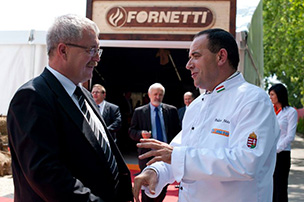
In the second half of the year 2013. we assigned a renowned market research company to do an overall brand image research of Fornetti as a brand. Results obtained thereby supported the validity of our intentions of modernisations planned for the year 2014.
2012, Hungary- Flavouring leaven from Tokaj
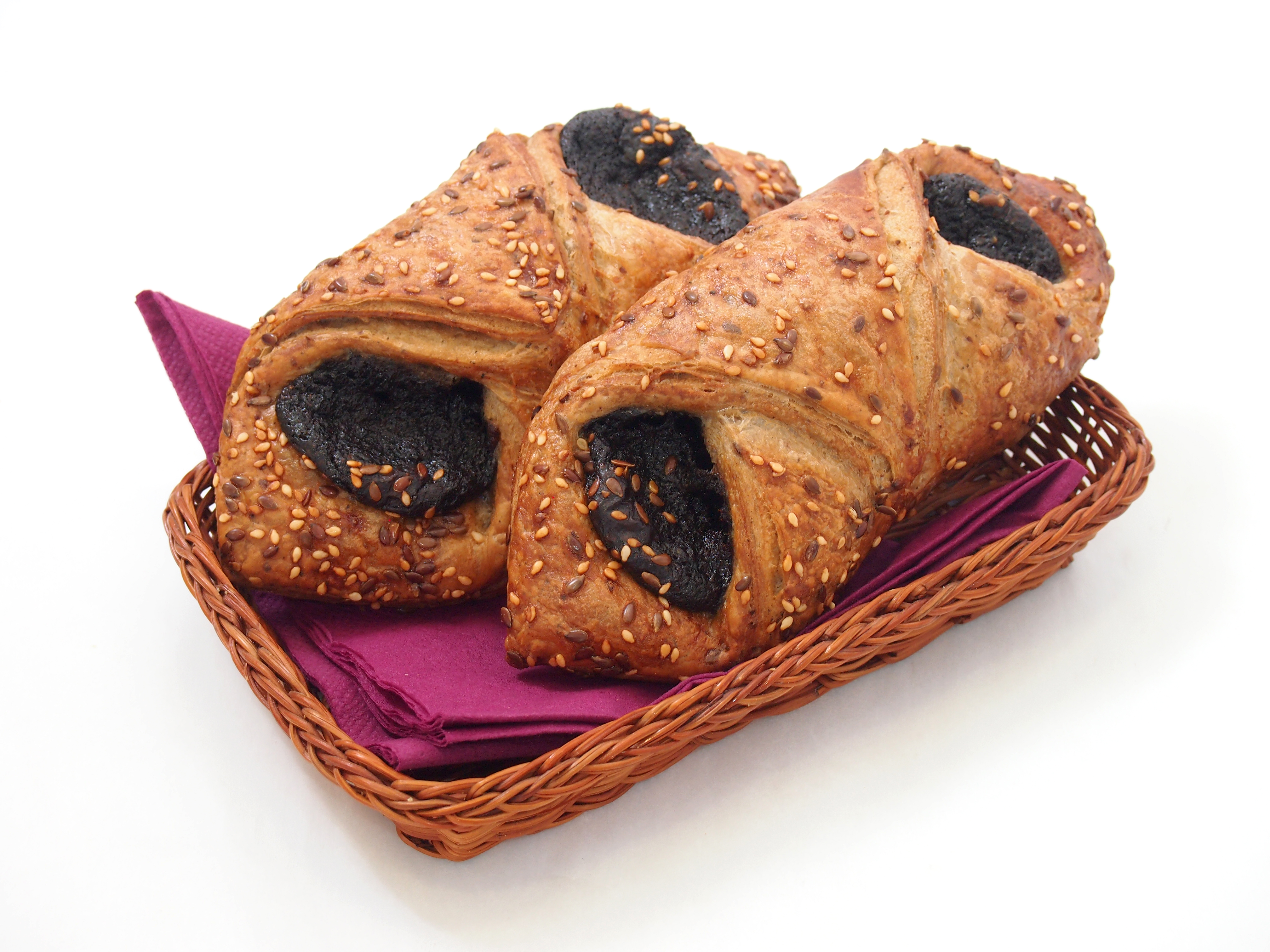
In spite of the uncertainty, Fornetti Franchise was doing relatively well in the Hungarian market: thanks to the new products, monthly sales rose by more than 100 tons, and the total quantity of products sold in 2012 was 18,642 tons.
This year also marked the start of a market management programme, new store-openings, store reconstructions, the introduction of new products, as well as the launch of a comprehensive product and technology development programme.
As a result of the research & development project (supported by a grant), Fornetti managed to develop a flavouring leaven extracted from the grape must of the Tokaj region. This helped improve the texture of products and enhanced the biting experience while preserving freshness and reducing crumbliness. This technology allows for the production of traditional leavened products (instead of products made from almost 100% baker’s yeast), which means that the best traditions of the Hungarian bakery can be applied —this is in line with the significant role of bread and bread-like products in the consumption habits of the Hungarian population.
Romania: An innovative programme was launched with existing partners to strengthen the franchise system.
Bulgaria: The many national meetups organized for partners helped popularize the unified franchise image widely.
2011, Hungary - The construction of a baking laboratory
The effects of the economic crisis were less significant in the Fornetti franchise network than in the average businesses in the industry. The monthly campaigns and the consistent implementation of previously started reconstruction and modernization processes helped reduce the drop in sales to a minimum. However, the downturn was noticeable on the international franchise market, especially in the Balkan region.
During this period of stagnation, Fornetti used the time to create its special baking laboratory, featuring various store types of the network as well as different pieces of technical and technological equipment. Intensive trainings began for colleagues in model stores.
Romania: As the crisis continued, only 250 out of the 560 employees stayed with the company.
Bulgaria: To compensate for the impact of the economic crisis and to increase the efficiency of the operation of franchise stores, elements of the “new era” programme were introduced in Bulgaria.
2010, Hungary- “New era” programme – On top of the game even at the time of the crisis
The “new era” programme started in 2010. It was aimed primarily at extensive store constructions, the unified modernization of stores, and the systematic organization of new design elements. Furthermore, stores switched to processes defined on the basis of the baking plan.
As a result of the “new era” programme launched after the economic crisis, new stores joined Fornetti’s franchise system, and a third of the existing stores grew by 15–20 percent in a few years thanks to the introduction of new product groups.
Fornetti manufactured the furniture of points of sale in its own plant. The items could be assembled module by module in all store types and it was therefore suitable for stores of various sizes. Fornetti’s own group of designers provided help to partners in the creation of their store, while the marketing group gave support in the preparation of the business concept.
Fornetti created a learning centre in the International Franchise Centre offering continuous training for its own employees as well as the employees of its partners. Subsequently, all Master Franchise companies created similar learning centres.
The launch of the “new era” programme also marked the beginning of the transformation of franchise partner stores as well as the replacement of technical and technological equipment in stores.
The company’s own furniture plant was equipped with new, computer-controlled manufacturing tools. A new designer division was created, which was responsible for the complete design of in-store bakeries. The designs were implemented by an extended pool of technical contractors acting as general contractors commissioned by franchise partners.
Besides the modernization and development of the franchise system, the brand image was also updated, and the new, second-generation logo was born. Our professionals created the four basic contract types that reformed the legal background of the franchise system. In summary, the foundations of Fornetti’s current franchise system were built on the elements of the “new era” programme.
Market activity was stimulated by new products and continuous campaigns, which compensated for the challenges posed by the crisis. At the same time, we increased our retail activity, and as a result, the first few retail contracts were made.
Romania: Due to the economic crisis, franchise and retail sales dropped noticeably. Just like in Hungary, the comprehensive “new era” development programme started in Romania.
Bulgaria: Modelled after the “Mini project”, the launch of the “M project” resulted in new partners joining the franchise network.
2009, Hungary - Change is approaching

Fornetti won the “Franchise network of the year” award of the Hungarian Franchise Association for successfuly completing the development and automation of its production plants abroad in spite of the adverse economic conditions.
However, the economic environment already indicated that Fornetti would soon have to change its business policy to provide modern, innovative, comprehensive, and reassuring solutions in response to the challenges.
Romania: The launch of the Fornetti Junior project marked the beginning of a test of premium products in various regions of the country.
Bulgaria: The construction of the new production plant with a floor area of 4000 sqm was finished. The company still operates here.
2008, Hungary - New products, new methods
In spring, we launched a truly special product, the pumpkin seed scones. Based on customer feedback and sales data, the new product soon became extremely popular with customers.
From 1st July, 2008, the test of Chocalate Fornetti began in 100 stores. Based on the results of the four-month test, we decided to make the product available in the whole country from 3rd November, 2008.
Furthermore, we announced several sales boosting programmes for stores, all of which proved successful.
Romania: The modernization of the plant, the warehouse, and the water purifying station marked the largest investment of the company at the time, costing a total of €10 million. The full automation of the previously semi-automatic production lines was also implemented.
Bulgaria: Fornetti Bulgaria bought a vacant lot in Ihtima and started a greenfield investment of €5 million.
2007, Hungary - Bidding farewell to trans fats

In September, a new campaign called “HIT OF THE WEEK” was launched in the franchise network, which meant that partners offered a product 20 percent off for a week in each two-week cycle.
Fornetti was among the first ones in the bakery industry to take action and use only low trans fat (“good”) margarine in its products. This required new production technology solutions while maintaining the usual enjoyment value and identical product quality.
Continuing the series of successful event participations, in summer, Fornetti appeared at the most important Hungarian festivals again. These events attract many locals and provide great feedback for our company, confirming that our products are well-known and popular.
Romania: Another milestone: the number of Romanian stores reached 1000. In October, Fornetti replaced high trans fat margarine in its products in this region as well.
Bulgaria: Following the establishment of Fornetti Bulgaria, the first Fornetti franchise store opened in the country.
2006, Hungary - Hectic times

In August, thanks to a €3.5 million development, we installed three completely automatic production lines in the Kecskemét plant with a production capacity of 1 ton/hour each.
In addition, we also started the replacement of the complete IT system costing a total of €1.2 million. As a part of this, we transformed our corporate management system, the customer service system, as well as the order management & invoicing system.
We introduced Fornetti’s per-piece product range called XXL Fornetti, and the Fornetti Pizza project was launched in the Fornetti Altro showroom in Kunszállás, offering dine-in as well as delivery options to customers.
Fornetti’s furniture plant and joiner’s workshop were also founded.
Throughout the year, Fornetti participated in several events in various parts of the country, including the Fish Soup Festival of Baja, the Balaton Cross-Swimming Competition, as well as the Debrecen Flower Carnival.
Continuing the 2005 charity initiative, at the end of the year, Fornetti's Foundation for Children with Heart Disease donated a total of HUF 15 million to 14 child medical care facilities.
Romania: The first per-piece products (XXL) and pre-leavened products were introduced, and a new finished goods warehouse was built.
2005, Hungary- Prestigious recognitions
On 19th May, Fornetti Pannon Kft’s production plant in Igal opened with its extended, 3000 sqm hall. The company played a major role in the life of Igal and its surroundings: at the time, almost 200 workers were employed here from 20 different towns. In the meantime, Fornetti Pannon Kft. received the BVQI certification, attesting compliance with the IFS food safety system.
The European Union’s central professional journal, Franchise Europe ranked Fornetti in 2nd place in its category in the top 500 list of 2005. Also, Fornetti placed 3rd on the European list of internationally renowned brands, which was a major achievement.
On 1st September, Fornetti Altro’s first reference store opened in Kunszállás. The furnishing was designed and implemented by Fornetti.
In December, Fornetti donated equipment to five hospitals spending a total of HUF 14 million, using the funds raised in the charity programme “Fornetti's Foundation for Children with Heart Disease”, which was complemented by Fornetti Kft’s donation as well as the down payment of the receiving institutions.
Romania: By the end of the year, the number of Fornetti stores reached 500.
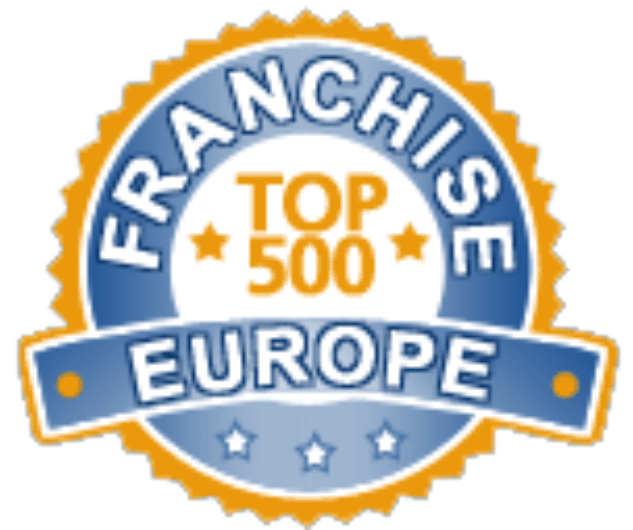
2004, Hungary - More innovation
 In the autumn of 2004, the revolutionary pre-leavened products were introduced in stores. These products can be prepared on site in just 15 minutes, they do not require thawing or leavening, therefore they allow for easier in-store preparation and they ensure constant quality.
In the autumn of 2004, the revolutionary pre-leavened products were introduced in stores. These products can be prepared on site in just 15 minutes, they do not require thawing or leavening, therefore they allow for easier in-store preparation and they ensure constant quality.
On 23rd November, the company received the BVQI certification in the Gundel Restaurant, attesting compliance with the IFS food safety system as well as with the ISO 9001-2000 quality management system.
The company kept growing and soon began building its Ukranian franchise network.
Romania: This year marked several regional reorganizations: three new regions were born along with two commercial supply centres in Bucharest and Agyagfalva.
2003, Hungary - The year of modernization
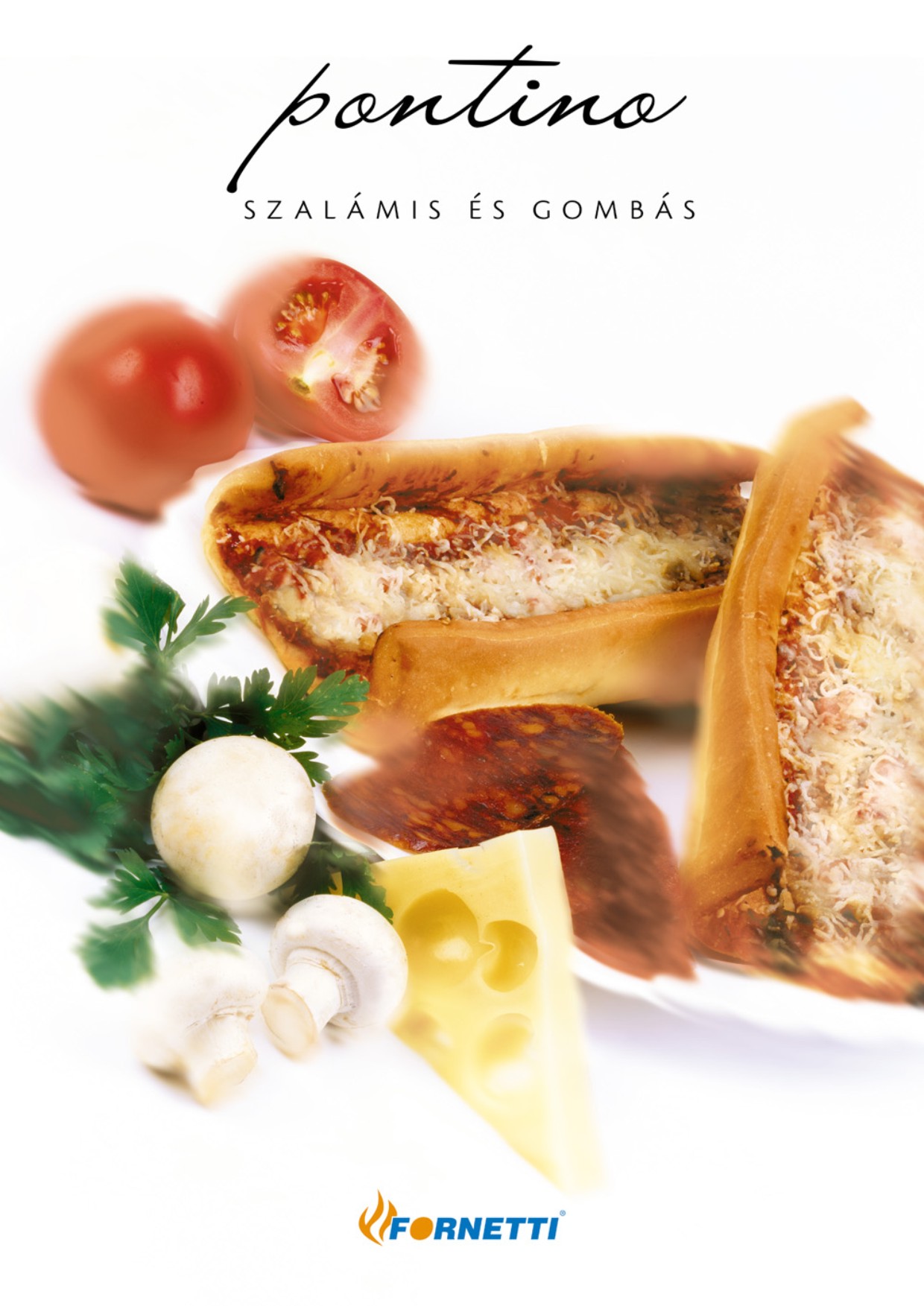 In 2003, Fornetti spent 1.5 billion on the modernization of its Kiskunfélegyháza plant, and installed the largest capacity continuous furnace in the country. Connected to an automatic production line, the furnace could produce 1 ton of ready-baked product every hour.
In 2003, Fornetti spent 1.5 billion on the modernization of its Kiskunfélegyháza plant, and installed the largest capacity continuous furnace in the country. Connected to an automatic production line, the furnace could produce 1 ton of ready-baked product every hour.
New pre-baked and ready-baked products were added to the product range; these were the croissant, the muffin, and the Pontino.
The first businesses of the franchise system outside of Europe opened in Kuwait.
The modernization also affected the management of orders from partners: from 2003, the sale of products was handled through an automatic system, which made the process simpler and more effective.
Romania: New telemea products were added to the product range, designed specifically for the Romanian market. Success came quickly: these products representing new flavours soon became the most popular members of the range.
2002, Hungary - the introduction of per-piece products
 The year 2002 began with the creation of a uniform image.
The year 2002 began with the creation of a uniform image.
The Fornetti Express product range was launched in March with yeast-free products not requiring leavening agents. Thanks to the technology, the on-site preparation time decreased to 35 minutes.
In May, Fornetti introduced the per-piece bakery products as an extension to its main product assortment, and in autumn, we launched bake-at-home products called “Fingers Food”, which were made available in the frozen food sections of stores.
From the middle of the year, our digital turbo oven became available to more and more partners thanks to a grant we had been awarded as part of the Széchenyi Plan.
Serbia was the next country to join our franchise system that year.
Romania: Fornetti moved its headquarters to Timisoara, which has been the home of the company ever since. The operation of the factory, which was constantly expanded and improved, had been based on the infrastructure of the existing plant.
Products manufactured in Timisoara: Apricot Fornetti, Sour Cherry Fornetti, Pizza Fornetti, Cottage Cheese Fornetti, Cheese Fornetti.
2001, Hungary - Technological progress
This year was particularly intriguing from a technological point of view: the company introduced its proprietary digitally controlled display oven called “Forno di Fornetti”, resulting in more balanced operation, more consistent product quality, and easier machine operation.
Among its many benefits, the most important one was the fact that its operation requires less attention thanks to the programmability of the machine: after the products have been placed in the oven, the program starts at the press of a button, and the machine lets the operator know when the baking has finished.
The Kecskemét manufacturing plant and franchise centre also opened: the opening ceremony of the complex (built with the support of the Ministry of Economic Affairs) took place on 17th August. The plant, with its 4000 m2 area, co-ordinated the work of 10 Fornetti Master Franchise businesses at the time.
Romania: After the establishment of Fornetti Romania, the company began its operation and expansion.
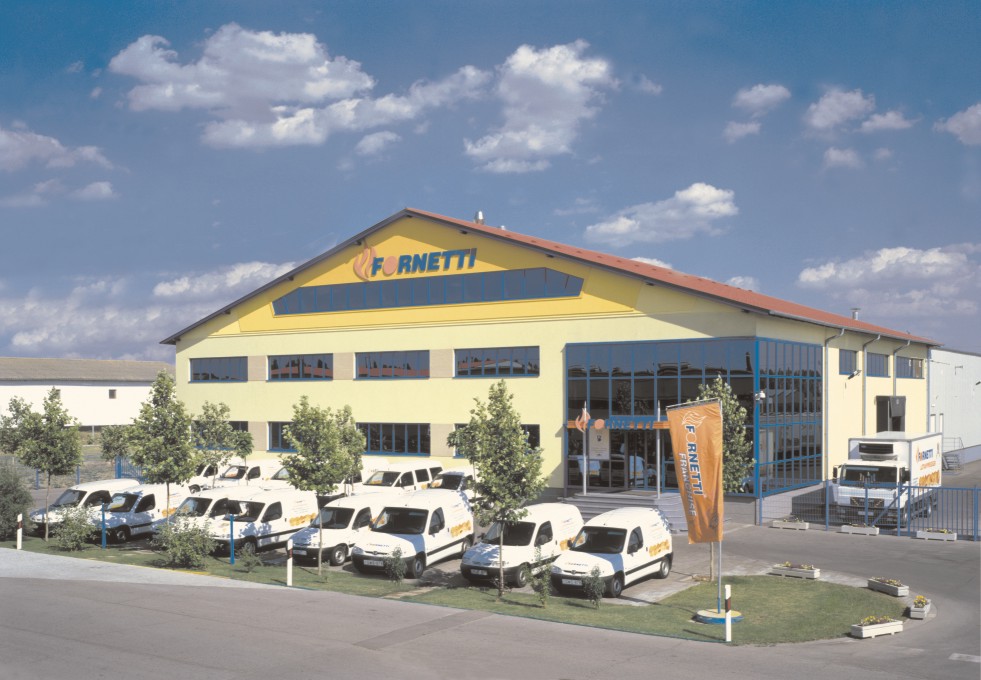
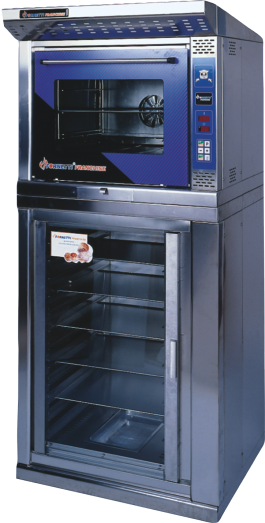
2000, Hungary - Quick expansion according to plan
 Fornetti began its explosive growth and soon became a market leader as a national franchise network. Its products were made available in all major cities and grocery stores, the number of partners kept growing, and international expansion also began: it was at this time that the first stores opened in the Czech Republic and Romania.
Fornetti began its explosive growth and soon became a market leader as a national franchise network. Its products were made available in all major cities and grocery stores, the number of partners kept growing, and international expansion also began: it was at this time that the first stores opened in the Czech Republic and Romania.
By this time, the number of franchise partners had exceeded 1200, which meant more than 1500 baking stations and franchise contracts.
The Fornetti network currently has more than 2700 baking stations in Central Eastern Europe. In the same year, Fornetti Info was launched. This is the company’s own information magazine aimed at providing broad-ranging information to partners.
This was also the year when Fornetti’s first major manufacturing plant opened in Kiskunfélegyháza.
1999, Hungary - Going international
This year marks the introduction of the all-time favourite Girella product which owes its popularity to the unique rolling technology used in its production.
At the same time, Fornetti began its international expansion with its products made available in Slovakia, Poland, and Croatia from 1999.
This was also the year when the “Product of the month” promotion campaign began. This meant that Fornetti began offering a new product each month.

1998, Hungary - The product range expands
On the first day of the year, the Igal-based Fornetti Pannon Kft. was founded following the purchase of the Franchise Master Licence. The company started a franchise network in the Transdanubia region.
It was during the same period that Fornetti’s first big production hall was built in Kiskunfélegyháza.
It is important to note that from the beginning of this year, the product assortment also included products with vanilla and apricot filling.

1997, Hungary - The birth of an iconic brand
József Palásti, master baker and founder of Fornetti began the production of frozen bakery products in the spring of 1997: on 1st March, the family-owned “Fagyasztott Pékáru-gyártó és Forgalmazó Kft.” was born.
At that time, the range of offered products could hardly be called versatile: it comprised of cheese scones and crackling scones. However, the business model was considered unique.
The sale of bakery products by the kilo combined with franchise operation soon proved to be a success.
